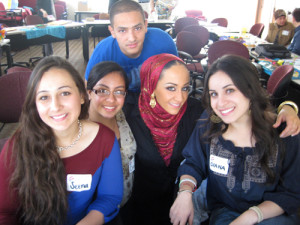Ethiopia Does Have a Legitimate Fear of Violent Religious Extremism
But The Government’s Response Threatens To Turn That Fear Into A Self-Fulfilling Prophesy
Address by M. ZUHDI JASSER, Commissioner, U.S. Commission on International Religious Freedom–Delivered at the Council on Foreign Relations, Washington, D.C., Feb. 14, 2013
Published in VitalSpeechesInternational.com, April 2013
Thank you for that kind introduction.
I want to thank Ambassador Campbell and the Council on Foreign Relations for inviting USCIRF here to share our findings about the situation of religious freedom today in Ethiopia, particularly as it pertains to the country’s Muslim population. We appreciate Ambassador Campbell giving us this platform today.
My remarks will be largely based on my visit to Addis Ababa from December 15 through the 19th of last year, as part of a USCIRF delegation.
My comments today will include a summary of our findings based on our own observations and our meetings with a number of key individuals in Ethiopia.
These individuals included the Minister of Federal Affairs; the Deputy Minister of Foreign Affairs; members of the Ethiopian Islamic Affairs Supreme Council or EIASC; the U.S. Ambassador to Ethiopia, Donald Booth; attorneys for imprisoned Muslim protestors and some protestors themselves; the Interim Patriarch of the Ethiopian Orthodox Church; the government’s Human Rights Commission; and members of several nongovernmental human rights and interfaith organizations.
Speaking for USCIRF, let me say that before our trip to Ethiopia, we were deeply concerned about reports about the deterioration of freedom of religion for Muslims in that nation, especially since July 2011, when the government first sought to change the way Islam was practiced and began to punish clergy and laity alike who resisted its new policy.
Our findings confirmed not only our concerns but our level of concern about the loss of religious freedom and its negative impact—both as a human rights issue and a potential security matter for Ethiopia and for the region.
Background
Before I get into our findings, let me provide some relevant background.
When it comes to religion, about a third of Ethiopians are Muslim, and most Muslims in Ethiopia traditionally have been Sufis.
The Ethiopian government has generally respected the religious freedom of its people, including Muslims, until very recently.
In Ethiopia’s constitution, Article 27 guarantees religious freedom and—to quote its words—”the independence of the state from religion.”
And in practice, Ethiopia has had a long history of religious toleration.
However, there are four critical factors that have set the stage for the recent shift away from honoring this vital human right.
First, there is the matter of geography.
Simply stated, Ethiopia is situated in an increasingly volatile region of the world. It borders Eritrea, Somalia, and both Sudan and South Sudan. In both Somalia and Sudan, violent religious extremists pose a genuine danger to Ethiopia.
Second, within its own borders, Ethiopia remains concerned about the growth of Wahhabism as a potential threat to the country’s stability and security.
Third, the policies of the Ethiopian government have significantly shriveled the country’s civil society.
The government has shut down independent newspapers, arresting their editors.
It has also imposed limits on foreign funding for human rights, democracy promotion, and conflict mitigation.
As result, domestic NGOs are left with a range of problematic choices.
They are either forced to work with the government, forgoing their independent status and drastically curtailing their activities, or to close up shop.
As a result, there are no independent groups operating in Ethiopia that can monitor religious freedom, undertake interfaith cooperation, or lead in intra-faith conflict mitigation activities.
And finally, in addition to its ongoing political repression of civil society, Ethiopia’s government has now chosen the way of religious repression in dealing with the threat posed by Wahhabism and related forces of religious extremism.
Overall, the policies pursued by the Ethiopian government have been a textbook example of how not to fight religious extremism.
July 2011 and Its Aftermath
In many ways, July 2011 was a pivotal point for religious freedom for Ethiopia’s Muslim community.
That’s when the government decided that the way to fight Wahhabism was not by increasing religious freedoms for Ethiopia’s Muslim community, but rather by importing imams from Lebanon who represented al-Ahbash, an alternative movement within Islam, to forcibly train Ethiopian imams and Islamic school educators on that sect’s beliefs.
For those who refused to be trained or to teach this imposed theology, the government began dismissing them from their positions and closing their mosques and schools.
This effort, which continued through the end of 2011, was conducted not only through the Ethiopian Ministry of Federal Affairs, but through EIASC, the Ethiopian Islamic Affairs Supreme Council.
As for EIASC, by the time this effort was launched, its members were being appointed by the government, instead of being elected by the Muslim community. Consequently, the Ethiopian Muslim community had no recognized and independent voice to share their concerns and objections.
By December 2011, the government’s actions to impose al- Ahbash triggered protests which have been held nearly every Friday outside of mosques following prayer.
In the spring of 2012, as the protests continued and the EIASC was unable to represent the community’s concerns, an Arbitration Committee of 17 Islamic scholars was created to negotiate with the government about respecting the constitution’s religious freedom guarantees, ending the imposition of al-Ahbash on Ethiopian Muslims, reopening and returning schools and mosques to their original imams and administrators. The Committee also asked that new elections be held for the EIASC and that the voting take place in mosques, rather than in government community centers.
By July of 2012, negotiations with the government had failed, and protests increased in both size and frequency.
In response, the government launched a crackdown, surrounded the demonstrators with police, and conducted house-to-house searches.
Between July 13 and July 21, it arrested all 17 members of the Arbitration Committee and nearly 1,000 protestors– although it did release all but 9 Committee members shortly thereafter.
The government escalated this conflict when, on October of last year, it leveled specific charges against the protestors, charging 29 of them—including the 9 Arbitration Committee members it was still holding, with terrorism and attempting to establish an Islamic state.
As of today, the government has presented no evidence to prove that any of these people are terrorists.
Moreover, the government has a history of using the Anti- Terror Proclamation under which they were charged as a tool to silence independent journalists and political opposition leaders, rather than to combat terrorism.
Our Meetings in Ethiopia
It is in this context that our meetings in Ethiopia occurred.
We met with attorneys for 28 of the 29 charged who reported that their clients were tortured and that they have had trouble meeting with those imprisoned. Our USCIRF delegation requested to meet with the 29, but the government did not grant our request.
In our meetings with government officials, they denied that the government played a role in the al-Ahbash trainings.
They insisted that their sole role was to educate participants about constitutional provisions relating to religious freedom and separation of religion and state.
They rejected our concerns that the government was forcing a particular religious belief onto a religious community, insisting that the government continues to respect individuals’ rights to believe as they wish.
They also said that they don’t violate religious freedom or meddle in religious affairs unless “red lines” are crossed, a term they failed to define.
The EIASC Question
They also claimed that the EIASC was solely responsible for the al-Ahbash trainings.
Yet the fact that EIASC members had been appointed by the government belies that claim, and not surprisingly, the EIASC is widely viewed as being government-controlled.
While the government did agree to allow new elections for EIASC in October 2012, protestors claimed the election was neither fair nor free and that the government vetted all candidates on the ballot.
In our meeting with EIASC, they reiterated, literally almost word for word, the government’s talking points about respect for separation of religion and state and called the protestors against government interference “terrorists.” Ironically, the Council used this charged language in spite of the fact that some of its members themselves had participated in the protests.
Furthermore, EIASC members constantly referred our questions to the Council’s vice president, whom our delegation later learned is close to Ethiopia’s ruling party. We have also learned that the Council’s president previously served in senior government postings.
Finally, and chillingly, the EIASC members said there would be no divisions within Ethiopia’s Muslim community and that those with different theological views would be, and I quote, “brought into the fold.”
Conclusion
So what does this all mean?
First, Ethiopia does have a legitimate fear of violent religious extremism.
Its neighbors include at least two countries, Somalia and Sudan, which remain hotbeds of such forces.
As we’ve said, within the nation, the growth of Wahhabism remains a challenge.
Further, there have been occasional incidents of religion-related violence.
In March 2011, for example, Muslim-led violence in the Jimma region damaged over 60 churches and homes after a reported Quran desecration.
But second, the government’s response to that fear threatens to turn that fear into a self-fulfilling prophecy.
Simply put, you don’t fight religious extremism with religious repression or with government meddling.
You fight it with religious freedom, opening up space for religious actors to freely and peacefully debate their beliefs.
You don’t fight it by dictating, rigging, or manipulating outcomes in the marketplace of ideas.
You fight it by promoting, as much as possible, a truly free marketplace of ideas, including religious ideas.
Above all, you fight it by trusting in the common sense of your own people.
You fight it by trusting that when given the choice, most people will instinctively reject a path that invites total strangers—violent and radicalized strangers—to exert complete control over every aspect of their lives and the lives of their loved ones.
The only real chance the radicals have of winning a critical mass of people to their cause—in Ethiopia or in most areas of the world—is if governments, in the name of fighting these extremists, seriously abuse their own people’s freedom.
And so our message to Ethiopia’s government, and indeed, to any government facing this challenge, is to fight and win the battle for hearts and minds by choosing the pathway of freedom.
But that must mean that these governments themselves must reject tyranny of every kind.
Make no mistake:
Study after study demonstrates a correlation between freedom and stability, freedom and social harmony, freedom and prosperity.
And study after study reveals a correlation between lack of freedom and lack of these great blessings.
In Ethiopia, as elsewhere, it is our hope that, not only for the sake of human rights, but for the advancement of stability, harmony, and prosperity, governments choose to fight radicalism with freedom.
Thank you.


